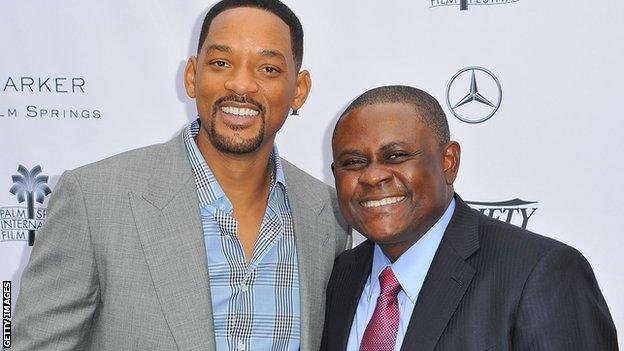
Rugby union's governing bodies must reach a settlement with former players suing for alleged negligence or the sport's future is at risk, according to one of the world's leading experts on brain injuries.
Legal action is being prepared against the Rugby Football Union (RFU), Welsh Rugby Union (WRU) and World Rugby.
Nine players are named in preparing the action but the law firm representing the group says more than 100 players have come forward.
Dr Bennet Omalu is the pathologist who discovered the brain disease chronic traumatic encephalopathy (CTE) and rocked American football with his research into the brain injuries sustained by players in the National Football League (NFL).
In 2011, a group of former American football players started a class action against the NFL and won a settlement worth about $1bn (£700m).
Earlier this year, it was alleged that Dr Omalu "exaggerates his accomplishments and dramatically overstates the known risks of CTE", though he denied those claims.
Dr Omalu believes rugby's authorities should pay compensation to the former players seeking legal action, including England's World Cup-winning hooker Steve Thompson and ex-Wales number eight Alix Popham, who have recently been diagnosed with early signs of dementia.
If the sport does not properly educate players about the risks, Dr Omalu warns rugby will "gradually be removed from mainstream culture".
In an interview with the BBC Scrum V podcast, Dr Omalu said: "The sports leagues knew that playing these games would cause brain damage.
"But like in everything, people were not asking questions, they were brushed underneath the carpet.
"I think some leagues historically placed the need to make money, they placed their business interests over the humanity of their business, which I have problems with."
Asked if rugby union's governing bodies had a duty of care to its players, Dr Omalu added: "My answer to that is yes, just like NFL in the United States settled with the players.
"They chose a specific type, every player beginning from this time backwards, we will pay you a compensation but moving forward, everybody now knows that playing football is dangerous, you play at your own risk. So I think the same should apply to rugby.
"Moving backwards you need to go to the players and settle. What my proposition is, the league should have a certain percentage of their profits for their retired players, say 10% ad infinitum, so that they use that money to compensate the retired players for the risk of brain injury."
Thompson, Popham and former Dragons centre Adam Hughes have spoken movingly about how their brain injuries have changed their lives.
Although they expected their rugby careers to take a physical toll, they do not believe they were sufficiently warned or educated about the risks of concussions and brain traumas.
"We chose to ignore that over the years and when you look back critically, historically like I did, rugby players, American football players have always exhibited these symptoms historically - it's just that we chose to ignore it," said Dr Omalu.
"We chose to conform to a certain expectation that these are our national sports, these are the games that we love and there can't be anything wrong with them.
"It's like when you're in love with somebody, there cannot be anything that person does that can be wrong. That is what we were suffering as a society.
"But now we know, the truth has come to light. What do we do about it?
"The league should settle with the players and then should make it categorically clear.
"What I've suggested is that beginning of every league there should be a one or two-hour lecture educating the players on the risk of brain damage.
"You need to celebrate these truths. If you don't do that, I bet you that it's only a matter of time until rugby will gradually be removed from mainstream culture.
"It is not a sustainable business model to continue living in a lie."
A spokesperson for the RFU said: "Rugby is a contact sport and while there is an element of risk to playing any sport, rugby takes player welfare extremely seriously and it continues to be our number one priority.
"As a result of scientific knowledge improving, rugby has developed its approach to concussion surveillance, education, management and prevention across the whole game.
"We have implemented coach, referee and player education and best practice protocols across the game and rugby's approach to head injury assessments and concussion protocols has been recognised and led to many other team sports adopting our guidance.
"We will continue to use medical evidence and research to keep evolving our approach."
You can listen to the full interview with Dr Bennet Omalu on the BBC Scrum V podcast here and on the BBC Sounds app.
Source: BBC Rugby Union News
